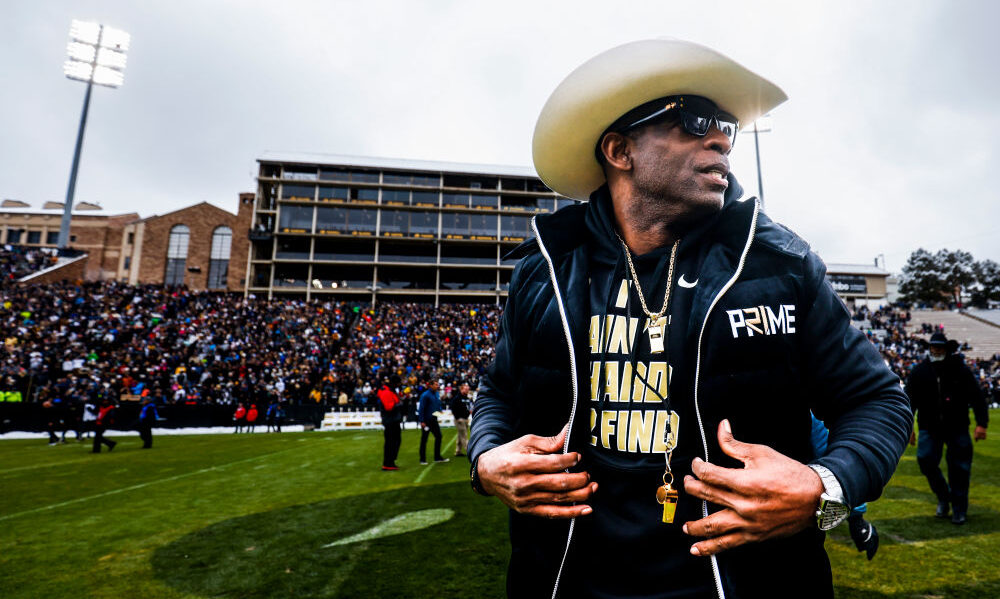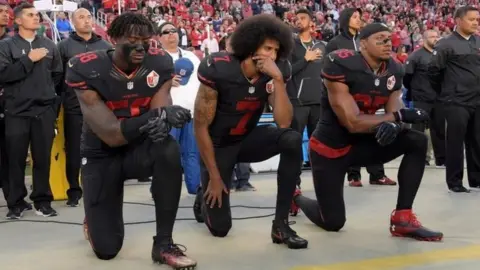In the high-stakes world of football, where tackles, touchdowns, and time-outs usually draw the most attention, a different type of stand-off took the spotlight: a battle between sportsmanship and activism. The distinguished Coach Prime, a vocal advocate for structured discipline and respect within his team, instigated a storm of debate and discussion when he decided to bench three of his consistent anthem-kneelers with a clear message: “Stand For The Flag.”
Known for his uncompromising dedication to both the sport and his athletes, Coach Prime has always walked a fine line between being a mentor and a strict disciplinarian. His decision to bench the three players who took a knee during the anthem wasn’t met without controversy. Supporters argue that such a firm stand protects the sanctity and unity of the sport, while critics view it as a suppression of the athletes’ voices and their right to peaceful protest.

To comprehend the motives behind Coach Prime’s decision, it’s crucial to explore his philosophy towards teamwork and patriotism. He has consistently emphasized the importance of unity, discipline, and collective respect, seeing the act of standing during the anthem as a symbol of solidarity not just with the team, but the nation. But does this infringe upon an individual’s right to express their dissent and fight for justice in a way that aligns with their conscience?

For the three players relegated to the bench, the coach’s directive places them in an unenviable position. On one hand, there is the aspiration to stand (or kneel) for what they believe is right and just, using their platform as professional athletes to draw attention to societal issues. On the other, there’s a distinct possibility of creating a rift, not only jeopardizing their careers but also potentially affecting team morale and unity.
The act of kneeling during the National Anthem, initiated by Colin Kaepernick in 2016, has been a silent yet resounding expression against racial injustice and police brutality. The act is embedded with a plea for recognizing and reforming systemic issues within society. When athletes kneel, it is not merely a physical act but a declaration of awareness and a call for change.
How has Coach Prime’s decision reverberated within the walls of the locker rooms? Teams are inherently built on trust and collective endeavor. When members are benched not for their athletic performance but for their personal beliefs and actions, it raises a pertinent question: where should the line be drawn between collective identity and individual expression?
With the benching of the three players, fans have found themselves on opposite sides of a deeply polarized debate. Social media has erupted into discussions, with hashtags such as #StandWithPrime and #KneelForJustice illustrating the stark divide. While some commend Prime for his stance on unity and patriotism, others condemn the act as oppressive and authoritarian, quashing the very freedom that the flag represents.

Coach Prime’s decision and the ensuing reactions unravel a multifaceted debate surrounding sports, activism, and the role of athletes in sociopolitical discourse. Can one demand respect for the flag while also honoring the fundamental rights it symbolizes? How does a team navigate the tumultuous waters of personal belief and collective identity?
Navigating through these complexities requires acknowledging the validity of both perspectives – respecting the flag and the right to protest against the injustices that prevail within the country it represents. It urges a deeper conversation about the role of sports figures in societal issues and the delicate balance between upholding team unity and respecting individual expression.
In the end, whether one agrees with the benching or not, the scenario compels society to reflect on the values we uphold and the lengths we’re willing to go to defend them. Coach Prime, the three players, and indeed, the spectators are all players in a much larger dialogue that transcends beyond the football field, nudging us to revisit and rethink where our allegiances lie – with silent conformity or respectful dissent.





